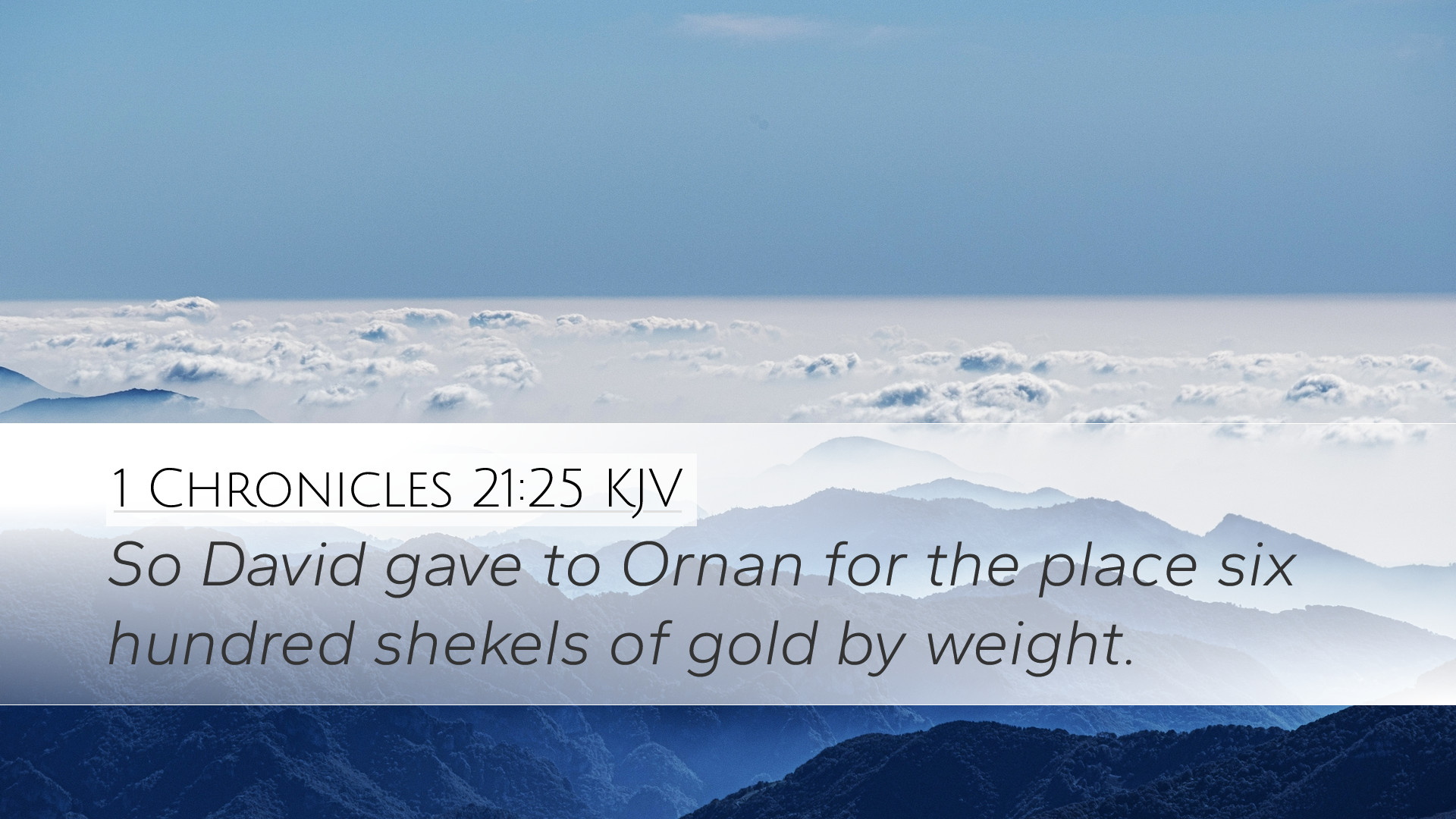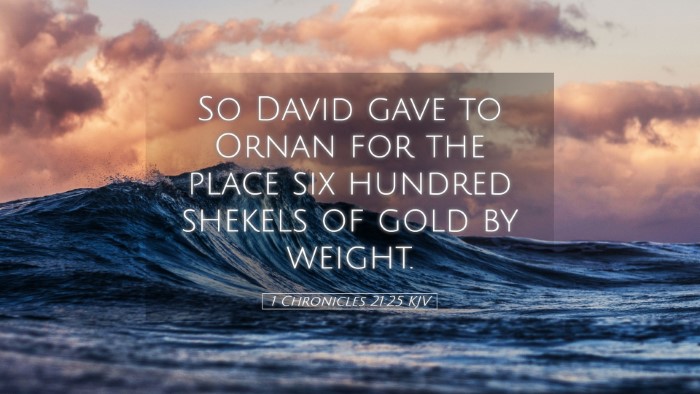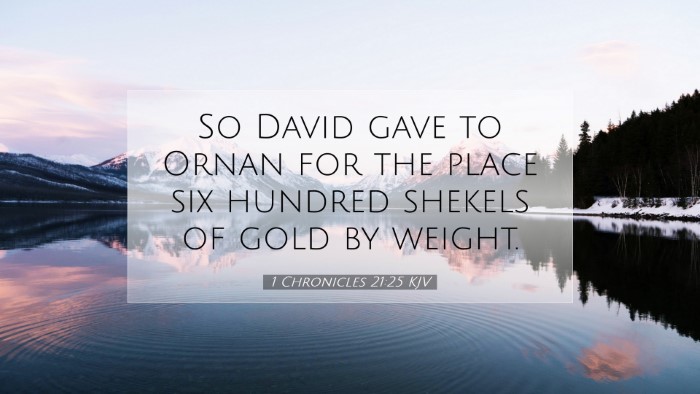Commentary on 1 Chronicles 21:25
Bible Verse: “So David gave to Ornan for the place six hundred shekels of gold by weight.” - 1 Chronicles 21:25
Introduction
The passage in 1 Chronicles 21:25 records a pivotal event in the life of King David, primarily focusing on the acquisition of a site for an altar to the Lord. The interaction between David and Ornan provides rich theological insights regarding sacrifice, worship, and God's provision. The commentaries from esteemed biblical scholars like Matthew Henry, Albert Barnes, and Adam Clarke shed light on the significance of this transaction and its implications for both David and the nation of Israel.
Contextual Background
To fully grasp the weight of this verse, it is crucial to understand its context. David had sinned by ordering a census of Israel, inciting God's anger. As a means of purging the nation and His king, God allowed a devastating plague to afflict Israel. David's repentance and his request for mercy led him to seek an appropriate location to offer a sacrifice. Ornan, a Jebusite, owned the threshing floor where David would build an altar.
Theological Insights
- The Principle of Sacrifice: Matthew Henry emphasizes that true worship is always marked by sacrifice. David's willingness to pay for the land signifies his commitment to God and the seriousness of his sin. It reflects the principle that genuine worship requires a cost, as echoed throughout Scripture (Luke 14:28).
- Redemption and Atonement: Adam Clarke notes that this act of purchasing the land symbolizes the principles of redemption and atonement. David understood that a worthy sacrifice must come from his own resources and be of significant value, paralleling the sacrificial system established in the Law.
- Sovereignty of God: Albert Barnes points out that the entire sequence of events underscores the sovereignty of God in Israel's history. David’s actions were guided by divine providence, showing that even in moments of sin, God orchestrates events for His glory and the ultimate good of His people.
- The Cost of Disobedience: There is a duality present in this verse where the consequences of sin are met with the redemptive action of sacrifice. This verse serves as a reminder of the high cost of disobedience while also revealing the boundless grace of God that offers restoration through proper worship.
Cultural and Historical Significance
Understanding the historical context around David's actions reveals much about the socio-religious dynamics of ancient Israel. The threshing floor was not merely a physical space; it represented a site of production and sustenance. Thus, its consecration as a place for worship signifies a tangible acknowledgment of every aspect of life being subjected to God—a principle that resonates deeply in both ancient and modern worship contexts.
Matthew Henry's Commentary
Matthew Henry reflects on the significance of David's designation of the location for worship. He emphasizes that David's selection of Ornan's site was divinely appointed, affirming that God's guidance persists even through human failings. Henry highlights that the price paid was not simply for a plot of land but is emblematic of the honor and weight of worship, illustrating that true worship entails more than mere ritualistic practices—it requires sacrificial investment.
Albert Barnes’ Perspective
Barnes illustrates that the price of six hundred shekels of gold, a considerable sum, reflects the seriousness of approaching God with reverence and sincerity. He discusses how David's purchase indicates a shift from a mere act of atonement to a recognition of the sovereignty of God over both land and worship. This point speaks volumes about the nature of how we view our resources and their relationship to our faith and service to the Lord.
Adam Clarke's Viewpoint
Clarke brings attention to the personal covenant being established through this act. By buying the land, David is not only securing a place for the altar but is also affirming his responsibility and leadership within the community. Clarke further asserts that David’s response to Ornan, who offered the land for free, was rooted in the understanding that sacrificial giving should involve personal investment, highlighting an essential truth about leadership in worship.
Application for Today
The narrative surrounding 1 Chronicles 21:25 prompts several important reflections for contemporary believers:
- The Cost of Discipleship: Emulating David's commitment involves understanding the cost of our discipleship and the value of what we offer to God. It challenges individuals to discern the investment they make in their spirituality and community.
- Integrity in Worship: The relational dynamic between David and Ornan emphasizes integrity in worship practices. It is essential that our approaches to worship simultaneously honor God's holiness and acknowledge our sinful nature.
- God's Sovereignty in Our Actions: Believers are called to recognize and submit to God's ultimate authority over their lives. Each decision, aimed at living a life of worship, should reflect the understanding of divine providence that shapes our paths.
- Embracing Community: Clarke's commentary on leadership encourages laity and clergy alike to foster a community culture that prioritizes sacrificial giving and communal worship, ensuring that worship is a collective experience rather than an isolated act.
Conclusion
1 Chronicles 21:25 serves as a powerful reminder of the intertwined nature of sin, repentance, and worship. The insights from Matthew Henry, Albert Barnes, and Adam Clarke reinforce the understanding that our worship must be marked by genuine sacrifice and an acknowledgment of God's sovereignty in our lives. This commentary reflects the devotional and theological richness of Scripture that ministers, students, and scholars alike can deeply engage with as they seek to honor God through their worship.


